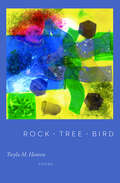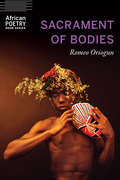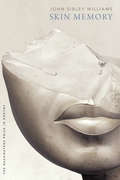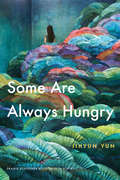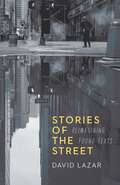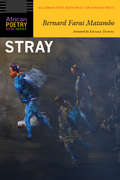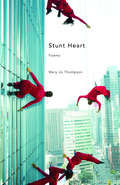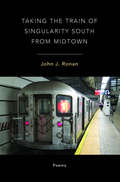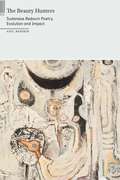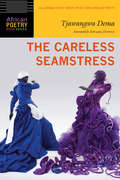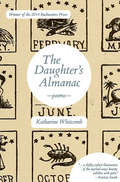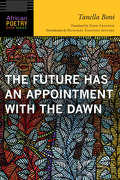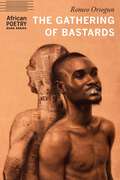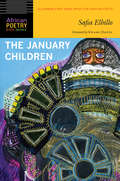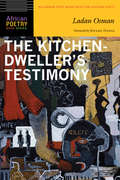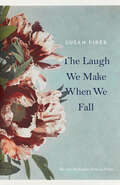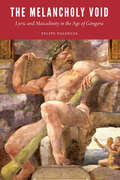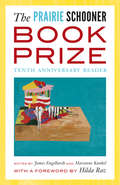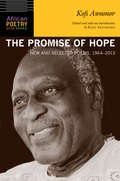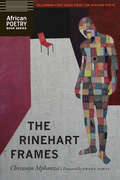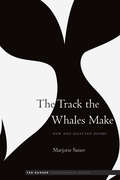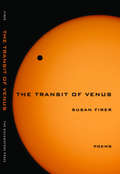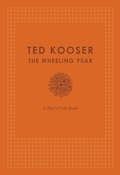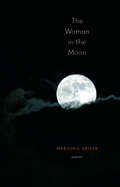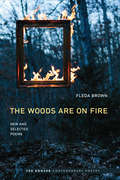- Table View
- List View
Rock Tree Bird
by Twyla M. Hansen2018 Nebraska Book Award This collection of poems by the State Poet of Nebraska covers significant emotional territory while remaining firmly grounded in the landscape. From memories of the isolation and beauty of growing up on a farm, to a burgeoning awareness as a teenager of the economic and cultural forces waged against family farming, to coming to terms with the legacies of her parents after their passing, and, finally, arriving at an appreciation of nature and the environment wherever and whenever she finds it, Twyla M. Hansen offers poems that are alternately sad, sweet, funny, moving, human, and humane.
Sacrament of Bodies (African Poetry Book)
by Romeo OriogunIn this groundbreaking collection of poems, Sacrament of Bodies, Romeo Oriogun fearlessly interrogates how a queer man in Nigeria can heal in a society where everything is designed to prevent such restoration. With honesty, precision, tenderness of detail, and a light touch, Oriogun explores grief and how the body finds survival through migration.
Skin Memory (The Backwaters Prize in Poetry)
by John Sibley WilliamsA stark, visceral collection of free verse and prose poetry, Skin Memory scours a wild landscape haunted by personal tragedy and the cruel consequences of human acts in search of tenderness and regeneration. In this book of daring and introspection, John Sibley Williams considers the capriciousness of youth, the terrifying loss of cultural identity and self-identity, and what it means to live in an imperfect world. He reveals each body as made up of all bodies, histories, and shared dreams of the future. In these poems absence can be held, the body&’s dust is just dust, and though childhood is but a poorly edited memory and even our well-intentioned gestures tend toward ruin, Williams nonetheless says, &“I&’m pretty sure, everything within us says something beautiful.&”
Some Are Always Hungry (Prairie Schooner Book Prize in Poetry)
by Jihyun YunWinner of the Prairie Schooner Book Prize in Poetry, Some Are Always Hungry chronicles a family&’s wartime survival, immigration, and heirloom trauma through the lens of food, or the lack thereof. Through the vehicle of recipe, butchery, and dinner table poems, the collection negotiates the myriad ways diasporic communities comfort and name themselves in other nations, as well as the ways cuisine is inextricably linked to occupation, transmission, and survival. Dwelling on the personal as much as the historical, Some Are Always Hungry traces the lineage of the speaker&’s place in history and diaspora through mythmaking and cooking, which is to say, conjuring.
Stories of the Street: Reimagining Found Texts
by David LazarWhen walking down the street, it is not uncommon to see lost items that have escaped their proper receptacles, but how often does one stop to read the messages left behind? David Lazar has stopped often, capturing the pieces of a &“lost world on the streets&” and thinking about the life of the discarder from the fragments left behind.Stories of the Street is a series of imaginative meditations—through prose poems, short-short essays, microfictions, and prose pieces without precise genre distinction—of what it means to encounter lost or discarded texts. Rather than simply deconstructing the lists, notes, receipts, or book pages he finds strewn in various cities, Lazar uses them as suggestive, capable of inspiring possible narratives that are at most latent in the text itself. The encounter, then, is an encounter with oneself and the mysteries of cities, where detritus frequently doubles as a sign saying, &“Consider this.&” Lazar&’s narrative voice ranges in tone from the comically antic to the melancholy. By photographing what he describes as &“messages that had escaped their bottles&” on-location as found, Lazar has become a flaneur of paper debris, puzzling over the evidence of urban human life.
Stray (African Poetry Book)
by Kwame Dawes Bernard Farai MatamboWinner of the Sillerman First Book Prize for African Poets, Zimbabwean writer Bernard Farai Matambo’s poems in Stray favor a prose-shaped line as they uncover the contradictory impulses in search of emotional and intellectual truth. Stray not only captures the essence of identity but also eloquently articulates the pain of displacement and speaks to the vulnerability of Africans who have left their native continent. This collection delicately examines the theme of migration—migration in a literal, geographic sense; migration of language from one lexicon to another; migration of a poem toward prose—and the instability of the creative experience in the broader sense.
Stunt Heart (The Backwaters Prize in Poetry)
by Mary Jo ThompsonIn Stunt Heart, Mary Jo Thompson’s debut collection,a female gaze locates the ironies inside the subjects of marriage and death, loneliness and love, speaking and silence. The title plays on both sick hearts and circus tricks, and appropriately, these poems are direct, personal, and disarmingly emotive. Look at the end of the first poem, “Says Penelope,” where the speaker suddenly veers to “Newsflash: I sleep- / walk.” These stark moments of admission are used to perfection in the centerpiece sonnet series, “Thirteen Months,” the collection’s highlight. Distilled emotion over the illness and death of an estranged husband ranges in tone from the dark humor that compares the marriage to a used car to the elegiac imagery of protecting the family garden from frost. The shock of seeing the deceased in his casket looking like a cross between Clark Gable and Dracula seasons the collection, recurring in ruminations on the various ways a body is prepared at death and the story of a mother who dies while sneezing. Although no one brings back the dead by writing poetry, in Stunt Heart,Thompson revisits them with credible humor and tough dispatches from bedrooms, graveyards, and hospital hallways. Thompson’s Stunt Heart jukes, dodges, and prays while muscling through all manners of demise and in the process reveals how one can turn grief into speech, art into grieving.
Taking the Train of Singularity South from Midtown
by John J. RonanThe general theme of this book, and a number of its individual poems, is that love and language create community. There is little self- reference and confession. Set in Gloucester, New York, or Paris, in Panama or Newtown, the poems come from a commitment to civic poetry, a poetry of social place and witness. Civic poetry is poems written for the public on community topics; poetry accessible to an attentive, general audience. And since it is often meant to be read in public, civic poetry relies on sound and familiar forms: rhyming tricks, assonance, consonance, regular rhythms, refrain and stanza, couplets, etc. And of course, civic poetry, like all poetry, is insightful, well-crafted and fresh, never talks down, and is never watered down.Besides accessibility, sound, rhythm, and freshness, there is another necessary ingredient in civic poetry: hope. Not innocent or immature hope, nothing naive. It may be a battered hope, even diminished, but is not cowed or faint, remains brassy, unabashed. Civic poetry makes no apologies for believing in our stressed and distorted, but wonderful national experiment.
The Beauty Hunters: Sudanese Bedouin Poetry, Evolution and Impact (On African Poetry)
by Adil BabikirThe Beauty Hunters offers a rare insight into Sudanese Bedouin poetry, its evolution, aesthetics, and impact. Through an in-depth profile of al-Ḥārdallo, the doyen of this art form, Adil Babikir explores the attributes that established him as a poet of international stature. The life of al-Ḥārdallo was a series of journeys in pursuit of beauty. From wandering across the Buṭāna wilderness to his adventures with women, he documented the ups and downs of his life using superb verse. In addition to its aesthetic value, al-Ḥārdallo&’s poetry offers rich material for Sudanese studies as it carries glimpses of the sociopolitical developments in Sudan during his lifetime, having lived through three distinct eras: Turco-Egyptian rule (1820–1885), Mahdist rule (1885–1898), and part of the Anglo-Egyptian era (1898–1956). Reading Bedouin poetry in a hybrid context, as a major contributor to what Babikir calls a uniquely Sudanese aesthetic taste, The Beauty Hunters makes an invaluable addition to the discourse on Sudan&’s cultural identity.
The Careless Seamstress (African Poetry Book)
by Tjawangwa DemaThis dazzling debut announces a not-so-new voice: that of the spoken-word poet Tjawangwa Dema. Winner of the Sillerman First Book Prize for African Poets, Dema’s collection, The Careless Seamstress, evokes the national and the subjective while reemphasizing that what is personal is always political. The girls and women in these poems are not mere objects; they speak, labor, and gaze back, with difficulty and consequence. The tropes are familiar, but in their animation they question and move in unexpected ways. The female body—as a daughter, wife, worker, cultural mutineer—moves continually across this collection, fetching water, harvesting corn, raising children, sewing, migrating, and spurning designations. Sewing is rendered subversive, the unsayable is weft into speech and those who are perhaps invisible in life reclaim their voice and leave evidence of their selves. As a consequence the body is rarely posed—it bleeds and scars; it ages; it resists and warns. The female gaze and subsequent voices suggest a different value system that grapples with the gendering of both physical and emotional labor, often through what is done, even and especially when this goes unnoticed or unappreciated. A body of work that examines the nature of power and resistance, The Careless Seamstress shows both startling clarity of purpose and capaciousness of theme. Using gender and labor as their point of departure, these poems are indebted to Dema’s relationship to language, intertextuality, and narrative. It is both assured and inquiring, a quietly complex skein that takes advantage of poetry’s capacity for the polyphonic.
The Daughter's Almanac (The Backwaters Prize in Poetry)
by Katharine Whitcomb"With unflinching stanzas threaded through with grief's relentless lyric, THE DAUGHTER'S ALMANAC is a masterwork, a deftly crafted illustration of the myriad ways beauty collides with pain. Succinct and utterly memorable, these poems take hold of the heart and tug it toward an insistent light. We are washed alive in that light. We are changed by it."—Patricia Smith, 2014 Backwaters Prize Judge
The Future Has an Appointment with the Dawn (African Poetry Book)
by Honorée Fanonne Jeffers Todd Fredson Tanella BoniTanella Boni is a major African poet, and this book, The Future Has an Appointment with the Dawn, is her first full collection to be translated into English. These poems wrestle with the ethnic violence and civil war that dominated life in West Africa’s Ivory Coast in the first decade of the new millennium. Boni maps these events onto a mythic topography where people live among their ancestors and are subject to the whims of the powerful, who are at once magical and all too petty. The elements—the sun, the wind, the water—are animated as independent forces, beyond simile or metaphor. Words, too, are elemental, and the poet is present in the landscape—“during these times / I searched for the letters / for the perfect word.” Boni affirms her desire for hope in the face of ethno‑cultural and state violence although she acknowledges that desiring to hope and hoping are not the same.
The Gathering of Bastards (African Poetry Book)
by Romeo OriogunLike I knew, standing on the seashore, the hunger wracking a migrant&’s body is movement. —from Romeo Oriogun&’s &“Migrant by the Sea&”The Gathering of Bastards chronicles the movement of migrants as they navigate borders both internal and external. At the heart of these poems of vulnerability and sharp intelligence, the poet himself is the perpetual migrant embarked on forced journeys that take him across nations in West and North Africa, through Europe, and through American cities as he navigates the challenges of living through terror and loss and wrestles with the meaning of home.
The January Children (African Poetry Book)
by Kwame Dawes Safia ElhilloIn her dedication Safia Elhillo writes, “The January Children are the generation born in Sudan under British occupation, where children were assigned birth years by height, all given the birth date January 1.” <P><P>What follows is a deeply personal collection of poems that describe the experience of navigating the postcolonial world as a stranger in one’s own land. <P><P>The January Children depicts displacement and longing while also questioning accepted truths about geography, history, nationhood, and home. The poems mythologize family histories until they break open, using them to explore aspects of Sudan’s history of colonial occupation, dictatorship, and diaspora. <P><P>Several of the poems speak to the late Egyptian singer Abdelhalim Hafez, who addressed many of his songs to the asmarani—an Arabic term of endearment for a brown-skinned or dark-skinned person. Elhillo explores Arabness and Africanness and the tensions generated by a hyphenated identity in those two worlds. No longer content to accept manmade borders, Elhillo navigates a new and reimagined world. <P><P>Maintaining a sense of wonder in multiple landscapes and mindscapes of perpetually shifting values, she leads the reader through a postcolonial narrative that is equally terrifying and tender, melancholy and defiant.
The Kitchen-Dweller's Testimony (African Poetry Book)
by Kwame Dawes Ladan OsmanWinner of the Sillerman First Book Prize for African Poets, The Kitchen-Dweller’s Testimony asks: Whose testimony is valid? Whose testimony is worth recording? Osman’s speakers, who are almost always women, assert and reassert in an attempt to establish authority, often through persistent questioning. Specters of race, displacement, and colonialism are often present in her work, providing momentum for speakers to reach beyond their primary, apparent dimensions and better communicate. The Kitchen-Dweller’s Testimony is about love and longing, divorce, distilled desire, and all the ways we injure ourselves and one another.
The Laugh We Make When We Fall (The Backwaters Prize in Poetry)
by Susan FirerIn Susan Firer&’s The Laugh We Make When We Fall, peonies; snow drops, &“with all their survivor ecstasies&”; &“windy caravans of lilacs&”; and &“Dali Lama-robed &“ daylilies act as magnets to attract history—personal and historical—myths, language, facts, love, gratitude, prayers, beauty, and &”all the colors of death and sex.&” Family oddities appear in this collection, as well as Catholic rituals, saints, and ghost poets. Always ghost poets: Whitman, Neruda, Thoreau, and Saint Francis. In these poems, &“toads/ pull their finished skins off/ delicately as evening gloves,&” and in &“Birds&” you can look into an injured bird&’s neck and see &“everywhere it had ever flown…&” see &“insects, & seeds, & amphibians,/ & even a piece or two of snake.&” Using list poems, exploded elemental odes, lyrics, and American sonnets, Firer writes her own survivor ecstasies: &“I was buried under/deaths: mother&’s, father&’s, sisters&’ deaths wrapped me/ like surgical wrap. And who and where would I be/ when all their gauzy deaths were removed?&” In poem after poem in this collection, Firer begins to explore and to answer that question. This collection is "a wild generosity of spirit," creating an effect that is "sacramental."
The Melancholy Void: Lyric and Masculinity in the Age of Góngora (New Hispanisms)
by Felipe ValenciaAt the turn of the seventeenth century, Spanish lyric underwent a notable development. Several Spanish poets reinvented lyric as a melancholy and masculinist discourse that sang of and perpetrated symbolic violence against the female beloved. This shift emerged in response to the rising prestige and commercial success of the epic and was enabled by the rich discourse on the link between melancholy and creativity in men. In The Melancholy Void Felipe Valencia examines this reconstruction of the lyric in key texts of Spanish poetry from 1580 to 1620. Through a study of canonical and influential texts, such as the major poems by Luis de Góngora and the epic of Alonso de Ercilla, but also lesser-known texts, such as the lyrics by Miguel de Cervantes, The Melancholy Void addresses four understudied problems in the scholarship of early modern Spanish poetry: the use of gender violence in love poetry as a way to construct the masculinity of the poetic speaker; the exploration in Spanish poetry of the link between melancholy and male creativity; the impact of epic on Spanish lyric; and the Spanish contribution to the fledgling theory of the lyric.The Melancholy Void brings poetry and lyric theory to the conversation in full force and develops a distinct argument about the integral role of gender violence in a prominent strand of early modern Spanish lyric that ran from Garcilaso to Góngora and beyond.
The Prairie Schooner Book Prize: Tenth Anniversary Reader
by James Engelhardt Marianne KunkelAfter ten years of selecting great books from writers, new and established, Prairie Schooner celebrates the first decade of its Book Prize series by offering this collection of excerpts from each year&’s winners in fiction and poetry. Writers such as Brock Clarke, Anne Finger, Rynn Williams, and Paul Guest open windows to ordinary and fantastic experience showcasing the liveliness and power of contemporary literature. Greg Hrbek&’s darkly comic, genre-bending tales stand alongside Ted Gilley&’s stories about achieving bliss through pain and John Keeble&’s reflections on community and the difficulty of love. Here Shane Book&’s poems serve as an elegiac witness to suffering, while Kathleen Flenniken&’s poems consider ordinary women constructing their own significance, and Kara Candito&’s explore sex, loss, and human passions.Whether the topic is fantastic or quotidian, childbirth or monsters, South American airplane disaster or suburban Wisconsin, this writing carries us to the furthest reaches of human experience.
The Promise of Hope: New and Selected Poems, 1964-2013 (African Poetry Book)
by Kwame Dawes Kofi Awoonor Kofi AnyidohoKofi Awoonor, one of Ghana’s most accomplished poets, had for almost half a century committed himself to teaching, political engagement, and the literary arts. The one constant that guided and shaped his many occupations and roles in life was poetry. The Promise of Hope is a beautifully edited collection of some of Awoonor’s most arresting work spanning almost fifty years. Selected and edited by Awoonor’s friend and colleague Kofi Anyidoho, himself a prominent poet and academic in Ghana, The Promise of Hope contains much of Awoonor’s most recent unpublished poetry, along with many of his anthologized and classic poems. This engaging volume serves as a fitting contribution to the inaugural cohort of books in the African Poetry Book Series.
The Rinehart Frames (African Poetry Book)
by Cheswayo MphanzaThe poems in The Rinehart Frames seek to exhaust the labyrinths of ekphrasis. By juxtaposing the character of Rinehart from Ralph Ellison&’s Invisible Man with the film 24 Frames by Abbas Kiarostami, the poems leap into secondary histories, spaces, and languages that encompass a collective yet varied consciousness of being. Cheswayo Mphanza&’s collection questions the boundaries of diaspora and narrative through a tethering of voices and forms that infringe on monolithic categorizations of Blackness and what can be intersected with it. The poems continue the conversations of the infinite possibilities of the imagination to dabble in, with, and out of history.
The Track the Whales Make: New and Selected Poems (Ted Kooser Contemporary Poetry)
by Marjorie SaiserMarjorie Saiser&’s strong, clear language makes the reader feel at home in her poems. Dealing with all the ways love goes right and wrong, this collection honors the challenges of holding firm to who we really are, as well as our connections to the natural world.The Track the Whales Make includes poems from Saiser&’s seven previous books, along with new ones. Her poetry originates from the everyday things we might overlook in the hurry of our daily routines, giving us a chance to stop and appreciate the little things, while wrapped in her comforting diction. Because the poems come from ordinary life, there is humor alongside happiness and sadness, the mixed bag we survive or create, day by day.
The Transit of Venus
by Susan FirerIn Firer's poems, place, often the western shore of Lake Michigan, provides an imagistic and sonic landscape in which language explores the 'empire of skin' with its daily happinesses and sorrows, gifts and losses. Often blue light illuminates these poems and frequently the language of a Catholic childhood shows up. Ezra Pound and William Carlos Williams's poems say 'Use everything,' and Firer does: receipts, anatomy, astronomy, clothes poles, paintings, checklists, quagga mussels, questions and grapefruit. Birds fly through these poems, insights too: 'For a minute / we are disguised / as human.' That quote concisely sums up Firer's main attentions: transience and time and with what and how we fill our brief time here on earth.
The Wheeling Year: A Poet's Field Book
by Ted KooserTed Kooser sees a writer’s workbooks as the stepping-stones on which a poet makes his way across the stream of experience toward a poem. Because those wobbly stones are only inches above the quotidian rush, what’s jotted there has an immediacy that is intimate and close to life. Kooser, winner of the Pulitzer Prize and a former U.S. poet laureate, has filled scores of workbooks. The Wheeling Year offers a sequence of contemplative prose observations about nature, place, and time arranged according to the calendar year. Written by one of America’s most beloved poets, this book is published in the year in which Kooser turns seventy-five, with sixty years of workbooks stretching behind him.
The Woman in the Moon
by Marjorie SaiserThe poems in this collection move into the past with her mother and father and also explore the present both with family and culture. The poems range in quick flourishes of conventional subjects rendered in exquisite imagery and observations to everyday occurrences that are suddenly spiked with clear focus and complex movements. Saiser’s poems are intricate and graceful in their treatments of numerous subjects, including landscape and evening, grocery stores and roadways, death and birth, love and loss, where sudden realizations seem at once deep and clear and natural. The voice in these poems is fluid and sure.
The Woods Are On Fire: New and Selected Poems (Ted Kooser Contemporary Poetry)
by Ted Kooser Fleda BrownThe Woods Are On Fire is Fleda Brown’s deeply human and intensely felt poetic explorations of her life and world. Her account includes her brain-damaged brother, a rickety family cottage, a puzzling and sometimes frightening father, a timid mother, and the adult life that follows with its loves, divorces, and serious illnesses. Visually and emotionally rich, Brown’s poems call on Einstein, Shakespeare, Sophocles, Law and Order, Elvis, and Beethoven. They stand before the Venus de Milo as well as the moon, as they measure distances between what we make as art and who we are as humans. In wide-ranging forms—from the sestina to prose poems—they focus on the natural world as well as the Delaware legislature and the inauguration of William Jefferson Clinton.The Woods Are On Fire includes nearly fifty new poems, along with poems selected from seven previous books, showcasing an influential American poet’s work over the last few decades.
